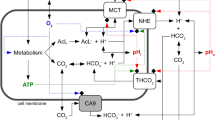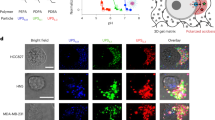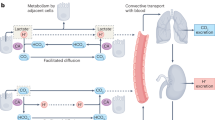Abstract
The mean extracellular pH (pHe) within solid tumours has been found to be lower than in normal tissues. Agents which cause intracellular acidification at low pHe might have selective toxicity towards cells in tumours. Weak acids (or their anions) with pKa values in the range of 4-6 have a higher proportion of molecules in the uncharged form at low pHe and can diffuse more rapidly into cells. The effects of organic acids including succinate, monomethyl succinate and malonate to acidify cells have been evaluated under conditions of different pHe in the acidic range. These weak acids caused intracellular acidification of murine EMT-6 and human MGH-U1 cells in a concentration and pHe dependent fashion. At concentrations of 10 mM and above, these acids also caused in vitro cytotoxicity to these cells at low pHe (< 6.5). The rate and extent of cellular acidification caused by these weak acids, and their cytotoxicity at low pHe, were enhanced by exposure to amiloride and 5-(N-ethyl-N-isopropyl)amiloride (EIPA), agents which inhibit Na+/H+ exchange, and hence the regulation of intracellular pH. Acid dependent cytotoxicity was also investigated in a murine solid tumour using the endpoints of growth delay and colony formation in vitro following treatment in vivo. Agents were tested alone or with 15 Gy X-rays to select a population of hypoxic (and presumably acidic) cells. Achievable serum concentrations of succinate were about 1 mM and no antitumour activity of succinate was detected when used in this way. It is concluded that weak acids are selectively taken up into cells, and can cause selective cellular acidification and toxicity, at low pHe in culture. Weak acids that are normal cellular metabolites are not toxic in vivo, but weak acids carrying cytotoxic groups offer the potential for selective uptake and toxicity under the conditions of low pHe that exist in many solid tumours.
This is a preview of subscription content, access via your institution
Access options
Subscribe to this journal
Receive 24 print issues and online access
$259.00 per year
only $10.79 per issue
Buy this article
- Purchase on Springer Link
- Instant access to full article PDF
Prices may be subject to local taxes which are calculated during checkout
Similar content being viewed by others
Author information
Authors and Affiliations
Rights and permissions
About this article
Cite this article
Karuri, A., Dobrowsky, E. & Tannock, I. Selective cellular acidification and toxicity of weak organic acids in an acidic microenvironment. Br J Cancer 68, 1080–1087 (1993). https://doi.org/10.1038/bjc.1993.485
Issue Date:
DOI: https://doi.org/10.1038/bjc.1993.485
This article is cited by
-
Lactobacillus plantarum PS128 prevents cognitive dysfunction in Alzheimer’s disease mice by modulating propionic acid levels, glycogen synthase kinase 3 beta activity, and gliosis
BMC Complementary Medicine and Therapies (2021)
-
Propionic acid induces dendritic spine loss by MAPK/ERK signaling and dysregulation of autophagic flux
Molecular Brain (2020)
-
Identification and characterization of Methyl succinate from Bacillus velezensis AR1
Australasian Plant Pathology (2020)
-
Bee pollen and propolis improve neuroinflammation and dysbiosis induced by propionic acid, a short chain fatty acid in a rodent model of autism
Lipids in Health and Disease (2019)
-
Butyrate enhances mitochondrial function during oxidative stress in cell lines from boys with autism
Translational Psychiatry (2018)



